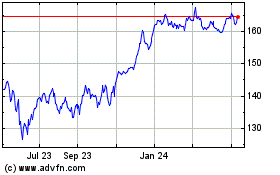California Regulators a Potential Obstacle to T-Mobile, Sprint Merger
January 26 2020 - 2:09PM
Dow Jones News
By Sarah Krouse
T-Mobile US Inc. and Sprint Corp. are waiting for a federal
judge to rule on whether they can merge, but the companies face
another hurdle even if they overcome that legal challenge: the
California Public Utilities Commission.
The state utilities overseer is the only such body that hasn't
yet blessed the $26 billion deal, and its continuing review
threatens to further delay -- or even derail -- a merger that has
dragged on for nearly two years. The state body has until July to
vote but might extend that timeline further.
Just how much power the California Public Utilities Commission
and other state bodies like it wield is unclear. Neither company is
based in California but, as nationwide wireless providers, they
have millions of customers in the state, and Sprint has a small
wireline business there. Most other state utility commissions have
approved the deal.
A spokesman for the commission said the review was continuing.
Representatives for Sprint and T-Mobile declined to comment.
Disapproval by a state public-utility commission could be enough
to stop a communications merger, consultants at NERA Economic
Consulting wrote in a 2017 paper that analyzed state reviews of 40
such transactions. The paper found that California, New York and
West Virginia historically have the most active utilities
commissions when it comes to reviewing communications mergers.
Other legal experts said that while the California commission
could demand further concessions from the carriers and delay the
deal's close, it was unlikely to scuttle the transaction. It was
more common for utilities commissions to block energy deals
involving local businesses than to block telecommunications
transactions, they said, because the latter involve wireless
service sold nationally.
"It has some leverage, but it's not endless," Samuel Weinstein,
an assistant law professor at the Cardozo School of Law at Yeshiva
University, said of the utilities commission. "What tends to come
out of these proceedings is some concessions by the merging
parties."
States typically seek remedies such as pricing guarantees or
infrastructure investments, the NERA authors found. When Frontier
Communications Corp. bought some Verizon Communications Inc.
wireline assets in 2015, for example, the California commission's
demands included requiring the company to make some price-control
commitments, invest in bringing broadband to rural areas and fund
the purchase of Wi-Fi-capable tablets.
State utilities commissions generally review communications
mergers to see if they are in the public interest and consider
factors such as what impact the deal will have on competition,
service quality and company employees.
California's public-utilities code states that no companies can
merge or acquire any public utility doing business in the state
without the commission's approval, whether or not that firm is
organized there. "Any merger, acquisition, or control without that
prior authorization shall be void and of no effect," it says.
State reviews often "impose significant and unnecessary costs in
the form of procedural burdens and delays," the NERA authors said.
One of the authors submitted an expert opinion on behalf of
T-Mobile when it sought Federal Communications Commission
approval.
The California commission, whose members are appointed by the
governor and approved by the state senate, has come under pressure
for its oversight of utility PG&E Corp., whose equipment
sparked several deadly wildfires.
The commissioner overseeing the review of the T-Mobile-Sprint
merger, Clifford Rechtschaffen, worked previously as a senior
adviser to former Gov. Jerry Brown and as special assistant
attorney general.
The public advocate's office within the Public Utilities
Commission said in a December brief that the deal in its current
form wasn't in the public interest. An administrative-law judge or
Mr. Rechtschaffen will now propose a decision that parties will
have 30 days to comment on before the commission votes on the
matter.
No date has been set for the vote, a commission spokesman
said.
State challenges have proved time-consuming for Sprint and
T-Mobile since the merger was announced in April 2018. A coalition
of state attorneys general sued to block the deal after FCC
Chairman Ajit Pai said he would support the transaction. The FCC
and the Justice Department later approved the merger after the
companies agreed to certain concessions, but most of the states
went ahead with their legal challenge.
If the companies prevail in the antitrust lawsuit and the deal
isn't approved in California, Sprint and T-Mobile could challenge
California's decision in court, which could test the power of
public-utilities commissions, legal experts said.
Write to Sarah Krouse at sarah.krouse@wsj.com
(END) Dow Jones Newswires
January 26, 2020 13:54 ET (18:54 GMT)
Copyright (c) 2020 Dow Jones & Company, Inc.
T Mobile US (NASDAQ:TMUS)
Historical Stock Chart
From Mar 2024 to Apr 2024

T Mobile US (NASDAQ:TMUS)
Historical Stock Chart
From Apr 2023 to Apr 2024
